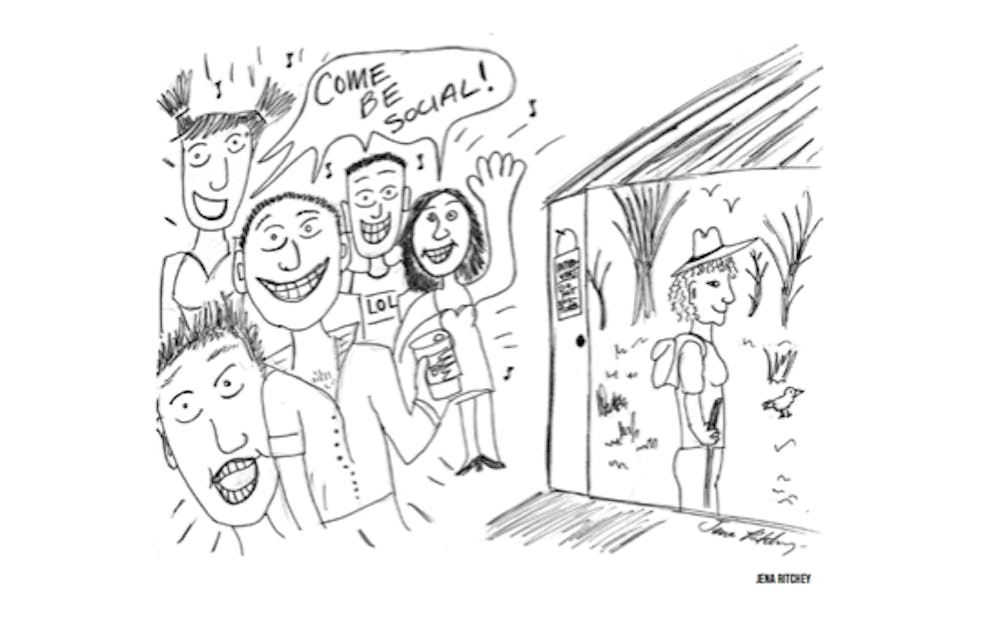I love to be alone. There is something so valuable about solitude, something so unique and singular, that I make a point to find it wherever I can. If I can find time to be alone, then that day is a success. Eating lunch by myself is the very least of the ways I can find solitude. I walk into town by myself, spend time with my thoughts at one of the cafés in town, and sit for hours in the Grille with nothing but a book for company. These moments are irreplaceable.
As is probably clear, I am an introvert. I gain energy from solitude and feel exhausted by social interaction. Going out on a weekend is overwhelming and often emotionally taxing. I don’t just like being alone, I need it for my mental health.
However, I am convinced that the benefits of solitude are not exclusive to introverts. Those who feel most at home surrounded by crowds of people could find time alone to be just as profound as I do. If we eliminate the common perception of solitude as unnatural and daunting, then the advantages become apparent for everyone.
The reason why people are so averse to the idea of being alone is that it is associated with feelings of loss and aimlessness. Solitude forces you to confront the situation of having no one around, no one to support you and talk to you, no one to respond to you. There’s nothing to externalize your thoughts. Instead, being alone creates an entirely self-contained sphere in which nothing exists except your own mind. And this is frightening. You involuntarily inspect your thoughts far more than usual, as every conversation is one-sided. Without the direction of others, you are forced to decide for yourself.
In other words, you have to trust yourself, and this is often difficult.
So, when we’re alone we feel this perceived loss of the people we normally surround ourselves with. But the truth is that aloneness is not the same as loneliness. There is no loss involved with solitude. It is simply the acceptance of you as the only actor within a certain moment.
When I find solitude, I feel separate, as if civilization continues around me, but I simply stepped aside and let it go. Nothing affects me. My worries fall away and leave me clear-headed and aware. I notice more without the distractions of others. In the aimlessness of being alone, I feel free to wander. To be without a goal is liberating. It allows me to focus more on where I am, where I am going, who I am and what I think.
When I walk into town or around campus by myself, I am truly not focused on anything else but the world around me. I notice the feeling of the air entering my lungs, the sound of birds calling and the wind rushing past my ears.
To step away—that is the ultimate benefit that solitude allows. The isolation from others insulates you from the chaos of social life. It enables you to sit in quiet, even if loud noises surround you. This is the quiet that comes when your mind is the only source of information, when no other stimuli are influencing your thoughts. This is the quiet that comes from acknowledging your existence as an individual.
We must detach our concept of loneliness from that of solitude. They are two very different concepts. The first is what we feel when we have lost someone, when that someone is gone for a significant amount of time. Solitude, on the other hand, has no loss attached to it. There is nothing to fear from being alone, because it is merely temporary. We fear solitude for those moments we might miss with friends, but as a result we forget about the most fundamental relationship we have: us with ourselves, our thoughts, our minds.
I seek moments alone because they give me clarity. They let me feel singular, apart, like an individual. They make me accept myself, and I invariably feel revived and enlightened. I believe we should all seek solitude for as little as a few minutes every so often. Maybe then we can recognize ourselves, who we are, and what really matters in our lives.
Artwork by JENA RITCHEY




